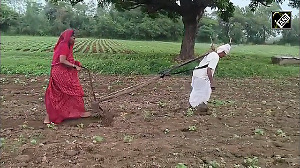Enquiries in Kalpetta showed that Wayanad will continue to support Rahul, but not to the same extent as in 2019, when his margin of victory had been enormous, reports Shyam G Menon.

The opening words in this concluding part of the election scene in Kerala should belong to a political commentator I spoke to in Thiruvananthapuram.
In the 2019 parliamentary elections from Kerala, the United Democratic Front (UDF) had executed a near complete sweep of the state's 20 seats.
Its primary opponent, the Left Democratic Front (LDF), could pick up just one seat.
Outlining the significance of the 2024 polls, the commentator said that the LDF wishes for the Bharatiya Janata Party and its Hindutva politics to be seen as a major problem at the national level.
It should logically make the LDF and its politics, ideal choice for Kerala.
Except, the LDF is a nobody beyond Kerala and its main constituent, the Communist Party of India-Marxist, even risks losing recognition as a national party if it doesn't garner a specific number of seats.
So it is, advantage to the Congress led-UDF again but with a catch.
"If the UDF does not get 17 seats or so, I would say they need to really ask themselves what they are doing. On the other hand, if the LDF can't corner the balance, I would say it is a verdict on how their government in Kerala has functioned," he said, late-March.
Fact is, much like the BJP at the Centre has been exhausting its critics and generally tiring people at large with its unchanged concoction of religion, nationalism, development and Modi-cult, the LDF has experienced an erosion of popularity in Kerala.
For long free of pressure from investigating agencies, that too seemed to change with the media reporting on March 27 that the Enforcement Directorate had filed a money laundering case against the chief minister's daughter.
Yet to offer anything meaningful for the electorate (beyond ever rising religiosity and fanning the development bogey) and desperate to open its parliamentary account from the state, the BJP fishes in these murky waters.
Against this backdrop, the final two constituencies hosting major contests in Kerala, are the following:
Wayanad
On April 3, Kalpetta in Wayanad, witnessed two political rallies.
The first one, which was of a modest size, featured the Communist Party of India's Annie Raja on her way to the local civil station to file her nomination papers for the 2024 Parliament elections.
The second rally of the day -- it was a big one -- featured siblings Priyanka and Rahul Gandhi, on their way to the same civil station to file Rahul's nomination papers to contest from the Wayanad parliamentary seat.
As the sitting MP, Rahul Gandhi, 53, has had a rocky ride.
Months ago, he was suspended from Parliament and his Lok Sabha membership hung by a thread.
Eventually, the Supreme Court ruled in his favour. Wayanad, angry at such treatment for its elected representative, stood by him.
But even in that disqualification phase, one thing was clear -- electing Rahul Gandhi and coping with him for MP had little to do with the genuine concerns of Wayanad.
And those concerns -- perhaps the biggest of the lot being man-animal conflicts in this region of hill farmers -- have only grown.
The church is involved in this scenario of agitated farmers; at times the clergy has asked if human lives don't matter as much as wildlife.
It is an issue that needs to be seen in perspective.
The church is present across the Kerala geography composed of sea coast, an intermediate zone of plains and small hills and finally, the forested big hills.
Within this, the sensitive parishes tend to be those where livelihood is insecure and risky.
Top of the list would be those on the sea coast because fishing is not only a risky activity; it also tapers during the monsoon resulting in stressed financial existence.
Next on the sensitivity index would be the zone of hill farmers where an emergent problem is that of increasing encroachment by wildlife on farms bordering forests.

Between the time of Rahul Gandhi's disqualification and his current return to Wayanad for re-election, these problems have only risen in Kerala.
Even as the Congress's competition raises these issues, fact is there is knowledge within the church itself that the problems are complex, related to climate change (when water and food depletes in forests, animals venture out) and without immediate solution.
Still the church has to speak up to seem responsible unto its parishes.
Further, the ruling state government has been tardy in showing empathy to the worries of the affected hill farmers.
As if the man-animal conflicts were not enough for headache amidst elections, the death of a student under violent circumstances at a college in Pookode near Kalpetta also became a big controversy in Kerala putting the Students Federation of India, the CPI-M's student wing, under a cloud.
Despite Wayanad hosting its share of the above said issues, none of it counts as regards Rahul Gandhi because he floats locally on a different set of equations.

To begin with, Wayanad as Parliament constituency is safe turf for the UDF courtesy assembly segments where its partner, the Muslim League, is influential.
In a sense, adequate votes for the UDF are assured.
Second, although the perception of Rahul Gandhi as potential prime minister has dipped since 2019, that tenor of thought still prevails alongside his electoral success viewed as relevant check on a BJP drunk with power and engineering divisive policies unchallenged.
Enquiries in Kalpetta showed that Wayanad will continue to support Rahul albeit not to the same extent as in 2019, when his margin of victory had been enormous.
Against Rahul's rather passive route to potential success in Wayanad, the real find of the constituency's 2024 rendezvous with Lok Sabha polls would seem to be the CPI's Annie Raja.
On April 2, we caught up with her at Korum on the campaign trail.
At a public meeting, she spoke mainly about the threat to India's secular fabric, which the BJP represented.
Articulate, to the point and speaking in fluent Malayalam, she had the people who gathered to see her, listening in rapt attention.
As with most LDF candidates, she had commenced her campaign adequately early.
The difference now was -- by April 2, it was formally known that notwithstanding their parties' partnership in the INDIA bloc, Rahul Gandhi would be contesting from Wayanad.
Annie Raja made it clear that it altered nothing. "I am contesting to win," she told me.
The day after the CPI and Congress candidates filed their nomination papers, the BJP candidate -- K Surendran, 54, state president of the party -- was due to file his.
At least some in Wayanad's business community would be backing his candidature as they find the BJP more receptive of their concerns than other parties.
The votes this translate into, would be among factors reducing the margin of the contest's leader.
- Part 1 in the Series: The Big Fights In Kerala
- Part 2 in the Series: The Most Important Contest In Kerala
Thrissur

It isn't always that a candidate who lost the elections makes his constituency important.
That is precisely what has happened to Thrissur which fits the profile of constituency the BJP has betrayed in its choices in Kerala.
Generally speaking, the DNA would seem temples and a community of the faithful to anchor the BJP's campaign along with possibilities to influence communities that swing votes.
Thiruvananthapuram, Pathanamthitta, Thrissur -- they all exhibit these traits.
Specifically, about Thrissur -- often called Kerala's cultural capital with its wealth of literature, arts and religious festivals, it is also a major hub of trade and commerce.
The man responsible for the above said predicament of someone who lost making his constituency noteworthy, is actor-turned-politician Suresh Gopi, who joined the BJP in 2016.
Although the 65 year old served as a MP, having been nominated to the Rajya Sabha in 2016, he hasn't yet won an election.
Contesting from Thrissur, he lost both the 2019 Lok Sabha elections and the 2021 assembly polls. The 2024 Parliament election is his third attempt.
The persistence, the optimism of striking luck third time around and the fact that a potential win could deliver the BJP its elusive Parliament seat from Kerala, has made Suresh Gopi the reason to remember Thrissur, in the latest edition of the polls.
The BJP's desperation to win a seat from Kerala seemed showcased well in a series of large hoardings in Thrissur promising a Union minister from the constituency if Suresh Gopi was elected.
On April 7, Suresh Gopi and members of his campaign team spoke at a function in a residential pocket associated with the city's Brahmin community.
The general tenor at the meeting was that there was no doubt as regards who would be elected to power at the Centre; it will be Narendra Modi yet again.
According to one of the speakers, the only question therefore confronting the Thrissur electorate was if they wanted a mere MP or one assured of being a Union minister; the latter opportunity being what voting for Suresh Gopi represented.
On his part, Suresh Gopi said that if elected, he would work not just for Thrissur but all of Kerala.
Aware of his critics sniping at him, he also mentioned that he wouldn't let his detractors decide what he is and asked his supporters to stay focused on improving the country.

Notwithstanding the optimism in that auditorium, the sentiment outside continued to be tricky for the BJP.
By April second week in Thrissur, some in the electorate had come to feel that the real contest was between the LDF's V S Sunil Kumar and the UDF's K Muraleedharan.
It was clear in such conversations that the occasional quirky behaviour and emotional outbursts Suresh Gopi was capable of, made it difficult for this section of the electorate to accept him as a representative.
The observation was surprising because Muraleedharan had been a late entrant in the fray, having been shifted from Vadakara (which he had won in 2019) to Thrissur, replacing the incumbent MP, T N Prathapan of the Congress.
In comparison, the CPI's V S Sunil Kumar was until 2021, the MLA from Thrissur while Suresh Gopi had been a presence in the town since before the 2019 elections.
Perceived to play in Muraleedharan's favour, courtesy he being the son of the late Congress stalwart K Karunakaran (former chief minister of Kerala), were votes from sections of the Hindu upper class that have traditionally supported the Congress party.
The other segment known to be crucial in elections from Thrissur is the Christian community.
When the BJP made overtures to the church and sought to influence Christians into voting for it, Thrissur would undoubtedly have been among constituencies it had in mind.
Thrissur has a sizable population of Christians (who are also influential in business) and their votes matter to a candidate seeking to win.
The BJP's newfound affection for Kerala's Christian community sparked a roller coaster ride locally as regards sentiments within the community.
In that period, some members of the clergy warmed up to the idea of favouring the BJP. Right-Wing factions within the community approved.
However, remarks made by the church, closer to the elections, have applied the brakes on that honeymoon.
Fuelled largely by how Christians were treated in North and North East India (Manipur), the current mood of the church is one of caution when it comes to the BJP.
Once the BJP is removed from the frame, Right leaning Christian votes, as usual, should favour the Congress.
Further, a tried and tested entity, Muraleedharan (despite his track record showing a series of constituency-shifts) has a reputation of doing things and taking care of his constituency.
It was in the hot afternoon of April 6 that I caught up with Muraleedharan, 66, at Muriyad, on the campaign trail.
Thrissur is among places in Kerala experiencing an abnormally hot summer in 2024.
Addressing a small group of supporters at Muriyad, Muraleedharan said that a vote for him was a vote for Rahul Gandhi and a vote for change.
Probably due to the intense heat and the number of places to be visited on the campaign trail, he kept his talk brief.

Miles away in Pullu, the blazing sun did not deter a robust turnout for the CPI's Sunil Kumar.
The former state agriculture minister also had in him, the energy and zest to speak to the electorate.
Party supporters arrived to welcome the 56 year old brought with them offerings of the crops they had grown.
Sunil reminded his supporters to vote carefully for there was another candidate with the same name fielded allegedly by competition.
"For me, the main point to highlight in my campaign is secularism; how secularism is currently threatened and the importance of protecting it," he told this writer.
The following day, April 7, one came across a concert celebrating plurality in voices, organised by the LDF at Thrissur's main circle around the Vadakkumnathan temple.
In Kerala, it is a matter of serious debate how deep the state's secularist attitude runs.
Some political observers feel that Kerala with its unique religious composition -- around 55 per cent is Hindu and the rest is made up of Muslims, Christians and other minorities -- is very unlike the reality in North Indian states where the BJP can bank on distinct Hindu majorities to push its agenda through.
Kerala's religious composition makes a secular state of existence its safest and most sustainable bet.
Challenge this -- as the BJP does -- and the provoker not only stirs a hornet's nest, but also runs the risk of seeing the push back grow proportionately to the provocation.
In constituencies like Thiruvananthapuram, the BJP has tried to side-step this risk by nudging the election discourse towards economic development.
It evokes 'Modi's guarantee' and tries to convince people that projects will be taken up and executed in time.
This focus on development may or may not work; the latter outcome being attributed to the state as it is very political and thereby incapable of feeling satisfied with a discourse around development alone, for parliament elections.

In Kerala, there are people who feel that development as subject of discussion, makes greater sense in assembly and local body elections wherein those elected typically work in close touch with the electorate.
Parliament elections, they feel, are meant to deal with the more abstract notion of country and general life in the country besides liaising with the Centre.
Given its sizable population of minorities; secularism and the state's coexistence with the Centre as part of the federal contract are major topics of interest in Kerala.
And it is discussed not just at the level of politicians and the upper echelons of society; the concern and discourse permeate to street level.
So far, the BJP has been poor at appreciating this.
That's why its candidates continue to be poised precariously in electoral battles, even after persistence harking of Robert Bruce.
Shyam G Menon is a freelance journalist based in Mumbai.
Feature Presentation: Aslam Hunani/Rediff.com











